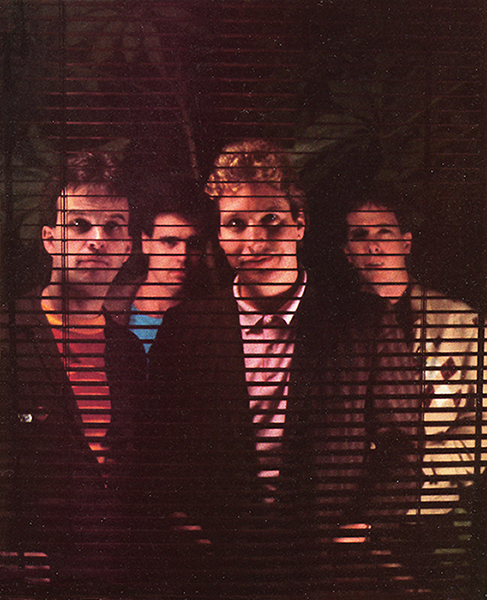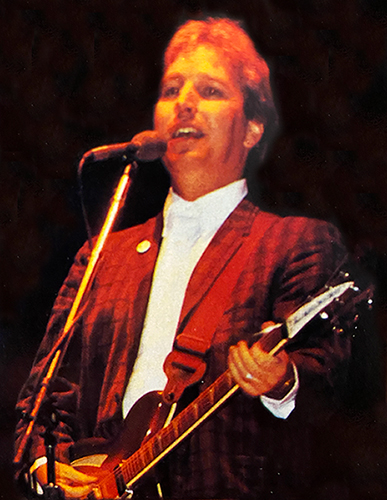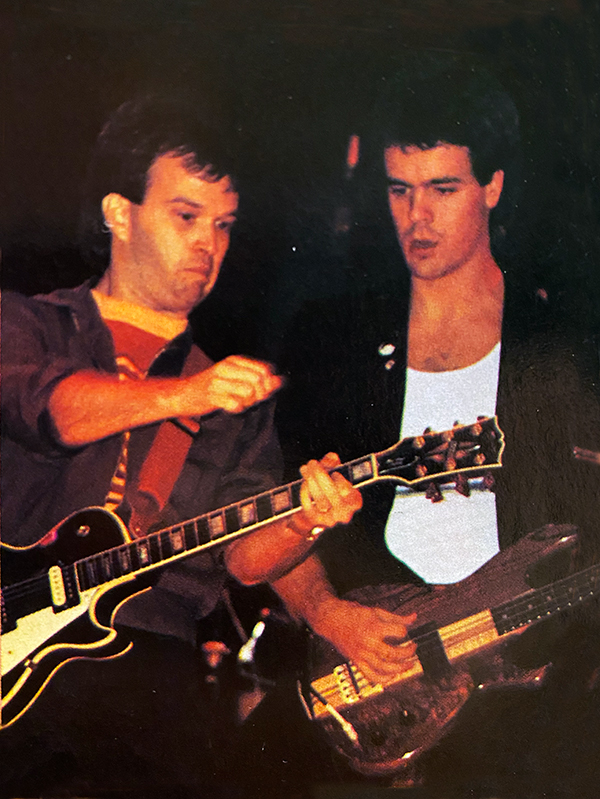A Band For The New Age
CCM March 1983
by Quincy Smith-Newcomb
Daniel Amos is a band that has been around. One could get the idea from listening to Alarma and their most recent chapter, Doppelganger, that they formed recently with a vision of presenting the Gospel in the high-tech '80s. One could forget their beginnings back in the mid-'70s as Maranatha! Music's good ol' boys, playing country music with a fresh, sometimes humorous, witness to the love of Jesus.
One could forget, but not many have. Daniel Amos' sojourn from their roots in country music to their present computer age rock and innovative new wave has left many a ccm fan bewildered. Some have welcomed the band's new sounds, and critics have praised them as the cutting edge of Christian music. More often, though, they have been accused of selling out, and their new musical and lyrical style has been misunderstood. This confusion over the band's identity and the often inadequate handling of them in the press has left Daniel Amos in a cloud of contention.
"I don't like controversy," stated Terry Taylor, DA's frontman and primary creative source, after a recent concert in Chicago. "I don't like to have to contend with people who don't understand us and who constantly question our motivation. I wouldn't keep subjecting myself to that if my motivation weren't to serve the Lord. We're still basically the same people we were eight years ago. We're still doing this because we love the Lord and we believe this is what God wants us to do."

Daniel Amos struggles to be found faithful to their Lord and to give their utmost to their art and music, which Taylor says was the "original vision." The band never intended to be thought of as a country band. "Daniel Amos desired to be a band," Taylor explains, "that, like the Beatles, could incorporate a whole spectrum of musical styles. But more than identification with any type of music was our sincere intention to serve the Lord with our music. We were just following the dictates of our hearts as God imparted to us what we should do. We flowed with it and we've been trying to flow with it ever since."
Daniel Amos started more than eight years ago when Terry Taylor, Steve Baxter, and two others moved from San Jose to southern California near Costa Mesa. Taylor comments on the early days: "We were really just a garage band, working out our vocal harmonies and simple acoustic arrangements. There was this incredible demand for what we were doing; people were constantly after us to play."
Caught in the predicament of any band with 20 minutes of music that gets asked to play for an hour, they wrote and worked up music that was simple and along a common denominator. Thus, the country music.
The music labeled Daniel Amos a country band, though the members never took the country image seriously. Taylor remembers, "As I look back on the music that we did, the whole cowboy schtick, it was almost satirical. Most of it was done as a humorous thing." He goes on to comment on that period's value for DA. "I don't take away from any of that. It was a good time for us, and it really established us in the Christian public. The music was more accessible, and it had more crossover appeal."

As the band moved toward the making of the now-monumental Shotgun Angel, DA crystallized into a strong musical entity. With Baxter off to Colorado to play country music, Taylor was joined by Jerry Chamberlain, Ed McTaggart, Marty Dieckmeyer, and Mark Cook.
"People always ask," comments Taylor wryly, "which one's Dan? We took our name from the two Old Testament prophets - Ezekial and Jeremiah."
Shotgun Angel was a hybrid, maintaining the band's country orientation while introducing rock themes in a very Beatlesque fashion. The album pointed to something much bigger than county music.
Shotgun Angel was more reflective of what we wanted to do," Taylor explains. "You always cringe when you look back at something you did in the past, but I still feel very good about it. I'm still - can I use the word? - proud of most everything on that album."
With the success of their second album, Daniel Amos looked to broadening horizons both musically and in terms of their ministry. It is this period, which could be aptly referred to as the "Horrendous Years," that hangs like a gray cloud over the heads of DA.
The Christian music community watched and waited for the release of the much-vaunted Horrendous Disc, while DA left Maranatha! Music to join with Larry Norman at Solid Rock Records, and then exited around the same time as Randy Stonehill, Tom Howard, and Mark Heard. Inquiry into that three-year period gets a responsive sigh from Taylor, as he says assuredly that "it all gets extremely complicated and I might add, it's extremely boring." While much that went on during that period remains invisible, and probably rightly so, there was much that is significant for a present understanding of Daniel Amos.
It was during this time that DA dropped all of the country music off their first two albums from their concerts. During the 'Amos and Randy tour,' an extremely enjoyable event combing DA's talents with Stonehill's, DA played only the satirical country piece by Cowboy Billy McBride, "Happily Married Man," which was invariably interrupted by Jerry Chamberlain with a screaming guitar solo and the quip, "I hate country!"
Fans who had anticipated hearing "Father's Arms" and "Posse In the Sky" were left up in the air.
The cover story that appeared in the Jan. '80 issue of CCM magazine labeled Daniel Amos as "Christian Music's Angry Young Men." The band was in the midst of a dramatic transition; they were sorting out the leading of the spirit regarding the direction of their ministry, their change in musical style was causing rejection in the community, and they were sorting out their emotional and professional commitments. The story emphasized the controversial nature of the band's struggles, presenting what the band now considers a less-than-balanced picture of Daniel Amos.
"The 'Angry Young Men' article probably hurt us. That was such a time of turmoil and upheaval for the band that we probably shouldn't have been doing interviews," Taylor concludes.
Another story appeared in the March '81 issue of CCM, with the intention of clearing up for the public what had happened to the then-still-unreleased Horrendous Disc. The story, however, left many readers confused about the relationships of DA and Larry Norman. The waters were muddied and the rumors abounded.
But that is history. Horrendous Disc was finally released and became one of the more successful albums of 1981. Alarma followed Disc by a few months, on a different level, with a new production company, Rebel Base Productions. Alarma opens a new, fresh period in the saga of Daniel Amos.
"I feel that we're a new band," comments Taylor about the new music. "In the beginning our influence was new wave. In the '60s it was the British invasion; that was new wave then." Alarma, which received considerable critical acclaim, made a large step from the Beatlesque sounds of Disc into the hottest, most energetic sounds of the '80s.
Again, the Christian audience wasn't sure what to make of the new Daniel Amos. "Alarma! is Daniel Amos," Taylor defends, countering accusations of trendiness. "Alarma! really is a group statement; it is what we do."
In response to inquiries about a return to country, Taylor explains, "We want to have musical credibility and we're making a statement by sticking to our guns on this thing. At this point in my life I'm just not into country music - it doesn't do anything for me. To bring country back into DA would cause confusion. We want to go in the direction we're going. It's not because new wave is popular; what we're doing now is a lot more challenging. The creative juices are flowing."
(Though country may not find it's way back into DA, Taylor has maintained a close relationship with Cowboy Billy McBride, the author of "Happily Married Man," which finally got onto vinyl as part of Maranatha! Music's Country Roundup album. Taylor reports that there is a possibility that McBride will tour and perhaps do an album. Country music fans, fret not.) Upon leaving Solid Rock, DA joined with Tom Howard to form Rebel Base Productions, which would provide a way to produce their own records, as well as a way to work with other artists. Taylor gives it more than professional significance however.
"We wanted to extend the sense of community that we had felt with the people we had worked with at Solid Rock: Randy, Tom, DA, and others. Rebel Base was our new flag." Drawing it's name from Star Wars, RBP has provided a marketplace for the differing production skills in the organization. Taylor has taken the most advantage, producing both of Stonehill's recent Myrrh albums, working with Tom Howard's Danger In Loving You, DA's last two, and with a newer group, Shelter, for release on Rooftop Records. Howard and DA have also recently formed a record company, Alarma Records and Tapes, the acronym being ART.
Alarma! was the first installment in a tetralogy which will bear the name The Alarma Chronicles. By the time you're reading this, Volume 2, Doppelganger should be available in stores. Volume 1 was a statement of warning to the Body of Christ. Taylor notes that this is a response to the evangelistic emphasis of Horrendous Disc.
"Alarma!," he states, "is our most Christian album. We were asking God to direct us and give us something to offer the Body of Christ. Alarma! is very Body oriented; it's a message to the Church."
The message is a call to maturity, to love and acceptance, to greater social consciousness, and to greater faithfulness to Jesus, the Lord and center. With the leaving of Mark Cook and Alex MacDougall, who joined up for Disc, DA was stripped back to a four-piece. Taylor's production emphasized the back-to-the-basics nature of the new compositions with a mix that was crisp but essentially raw. The result is an album that is compelling and challenging at the same time. Doppelganger extends and embellishes the direction and message of the first volume.
"Volume 2 of the Alarma Chronicles," comments Taylor, "is much more complementary musically to Alarma! than anything else we've done."
While that remains true, the music of Doppelganger has greater compositional diversity and depth. More consideration was given to production, and the result is more bass in the mix, the addition of keyboards, and greater concern with the creativity inherent in the lyrics.
The theme of Doppelganger arises out of the Apostle Paul's assertion that we dwell on two planes; the earthly and the heavenly. We all have to deal with our doubles, and we all face the temptation of serving other gods, in this mechanistic culture where the two planes co-exist. While the music progresses in the new-wave vein, the broader compositional base and thicker sound will no doubt attract many a Horrendous Disc fan. Doppelganger is clearly Daniel Amos' greatest effort, and like Volume 1 it continues the story and points to Volume 3, which will be titled Vox Robotica (Voice Of The Robot). When asked about the rest of the Chronicles, Taylor assures that they are prepared in outline form and "we'll just have to wait."
Terry Taylor is a man of integrity and authenticity. While recognizing that Daniel Amos is not the norm in Christian music, he doesn't let that stop him.
"We're coming from a different angle," he realizes, "but this is reflective of the diversity in the Body of Christ." As for living with controversy, he comments, "I got to the point where I stopped losing sleep over people who couldn't accept who I am and what God is doing in my life. I'm confident of the Lord to perfect it, but I try to be realistic."
Taylor struggles with the culture and presents the issues he sees breaking in on the Church. In his writing, he says, "I'm looking for the answers; I'm saying this is my culture, here are our problems. Here are my problems. And, of course, it's true that Christ is the ultimate answer, but that requires a response." He tries to bring these struggles into his art.
"I know that I want to bring the Lordship of Christ to the arts," Taylor states. "I want to write songs that are good; I want to bring credibility to what people call Christian music. As a Christian I want to write more than just a good Christian song; I want to write a good song."
From the sounds of Doppelganger, Daniel Amos may remain a source of controversy on the horizon of contemporary Christian music, perhaps in the same way that the Old Testament prophets that they take their name from were a source of controversy in Isreal. In the meantime Daniel Amos offers their sparkling wit, energetic music, and intelligent commentary for all who would listen.
Research assistance by Bruce Brown
